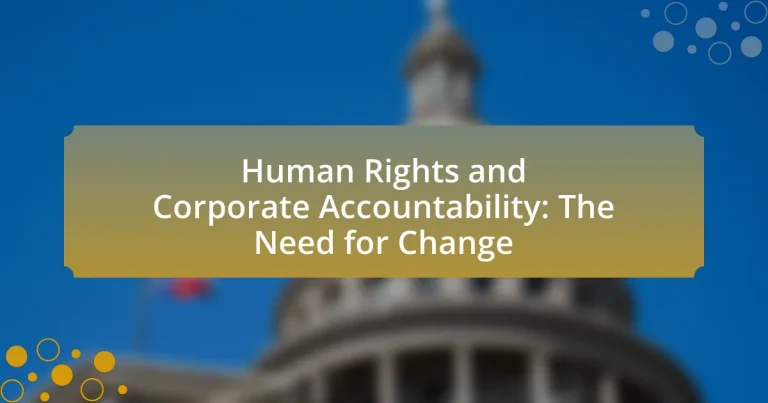Human rights are fundamental entitlements that every individual possesses, encompassing various rights including civil, political, economic, social, and cultural rights. Corporate accountability refers to the obligation of businesses to respect and uphold these rights within their operations and supply chains, as outlined by international frameworks such as the United Nations Guiding Principles on Business and Human Rights. The article examines the definition of human rights in the context of corporate accountability, the international frameworks supporting these practices, and the responses of corporations to their human rights obligations. It also discusses the importance of corporate accountability in protecting human rights, the consequences of negligence, and the challenges in enforcing accountability. Additionally, the article highlights the evolving business landscape regarding human rights, the role of stakeholders, and the need for stronger legislation and international cooperation to enhance corporate accountability.

What are Human Rights and Corporate Accountability?
Human rights are fundamental entitlements inherent to all individuals, encompassing civil, political, economic, social, and cultural rights. Corporate accountability refers to the responsibility of businesses to respect and uphold these human rights in their operations and supply chains. The United Nations Guiding Principles on Business and Human Rights establish that companies must avoid infringing on the rights of others and address adverse impacts with which they are involved. This framework emphasizes that corporations have a duty to conduct due diligence to identify, prevent, and mitigate human rights violations, thereby reinforcing the necessity for change in corporate practices to align with global human rights standards.
How are human rights defined in the context of corporate accountability?
Human rights in the context of corporate accountability are defined as the obligations that businesses have to respect, protect, and fulfill the rights of individuals affected by their operations. This definition is grounded in international human rights frameworks, such as the United Nations Guiding Principles on Business and Human Rights, which outline that companies must avoid infringing on the rights of others and address adverse human rights impacts with which they are involved. For instance, corporations are expected to conduct due diligence to identify, prevent, and mitigate human rights risks in their supply chains, thereby ensuring that their business practices do not contribute to human rights violations, such as forced labor or discrimination.
What international frameworks support human rights in business practices?
International frameworks that support human rights in business practices include the United Nations Guiding Principles on Business and Human Rights (UNGPs), the OECD Guidelines for Multinational Enterprises, and the International Labour Organization (ILO) Conventions. The UNGPs, endorsed by the UN Human Rights Council in 2011, provide a global standard for preventing and addressing the risk of adverse human rights impacts linked to business activity. The OECD Guidelines offer recommendations for responsible business conduct in a global context, emphasizing respect for human rights. Additionally, ILO Conventions set international labor standards that protect workers’ rights, reinforcing the obligation of businesses to uphold human rights in their operations.
How do corporations typically respond to human rights obligations?
Corporations typically respond to human rights obligations by implementing policies and practices aimed at compliance with international standards. These responses often include conducting human rights impact assessments, establishing codes of conduct, and engaging in stakeholder consultations to identify and mitigate risks. For example, the UN Guiding Principles on Business and Human Rights outline a framework that many corporations adopt to ensure they respect human rights throughout their operations. Additionally, corporations may report on their human rights practices through sustainability reports, demonstrating accountability and transparency in their efforts to uphold these obligations.
Why is corporate accountability crucial for protecting human rights?
Corporate accountability is crucial for protecting human rights because it ensures that businesses are held responsible for their actions and impacts on individuals and communities. When corporations are accountable, they are more likely to adopt ethical practices, comply with human rights standards, and mitigate risks of exploitation and abuse. For instance, the UN Guiding Principles on Business and Human Rights emphasize that companies have a responsibility to respect human rights and provide remedies for violations. This framework has been supported by various reports, including the 2018 UN report which highlighted that corporate accountability mechanisms can lead to improved human rights outcomes in supply chains. Thus, accountability mechanisms compel corporations to prioritize human rights, fostering a culture of respect and protection.
What are the consequences of corporate negligence regarding human rights?
Corporate negligence regarding human rights can lead to severe legal, financial, and reputational consequences. Legally, companies may face lawsuits and penalties for violating human rights laws, such as the United Nations Guiding Principles on Business and Human Rights, which can result in significant financial liabilities. Financially, negligence can damage a company’s stock value and lead to loss of business partnerships, as seen in cases like the Rana Plaza disaster, where companies involved faced substantial financial repercussions and loss of consumer trust. Reputationally, corporations may suffer long-term damage to their brand image, leading to decreased customer loyalty and negative media coverage, which can hinder future growth and market opportunities.
How can corporate accountability enhance human rights protections?
Corporate accountability can enhance human rights protections by ensuring that businesses adhere to ethical standards and legal obligations that safeguard individual rights. When corporations are held accountable for their actions, they are more likely to implement policies and practices that prevent human rights abuses, such as forced labor or discrimination. For instance, the UN Guiding Principles on Business and Human Rights emphasize that companies should respect human rights and provide remedies for violations, which encourages proactive measures to protect vulnerable populations. Additionally, research indicates that companies with strong accountability frameworks experience fewer legal disputes and reputational damages, reinforcing the importance of human rights in corporate governance.
What challenges exist in enforcing corporate accountability for human rights?
Enforcing corporate accountability for human rights faces significant challenges, primarily due to the lack of binding international regulations and inconsistent national laws. Corporations often operate across multiple jurisdictions, which complicates the enforcement of human rights standards, as different countries may have varying legal frameworks and enforcement mechanisms. Additionally, many corporations prioritize profit over ethical considerations, leading to insufficient internal policies to address human rights issues. According to the UN Guiding Principles on Business and Human Rights, only a small percentage of companies have implemented effective human rights due diligence processes, highlighting the gap between corporate practices and accountability. Furthermore, victims of human rights abuses often encounter barriers to justice, including limited access to legal recourse and the financial power of corporations, which can deter claims. These factors collectively hinder the effective enforcement of corporate accountability for human rights.
What role do governments play in regulating corporate behavior?
Governments play a crucial role in regulating corporate behavior by establishing laws and regulations that ensure companies operate ethically and responsibly. These regulations include environmental protections, labor laws, and anti-corruption measures, which are designed to safeguard public interests and promote fair competition. For instance, the Sarbanes-Oxley Act of 2002 in the United States was enacted to enhance corporate governance and accountability following major financial scandals. This act mandates strict reforms to improve financial disclosures and prevent accounting fraud, demonstrating how government intervention can directly influence corporate practices.
How do cultural differences impact corporate accountability globally?
Cultural differences significantly impact corporate accountability globally by influencing ethical standards, stakeholder expectations, and regulatory compliance. For instance, in collectivist cultures, companies may prioritize community welfare over individual profit, leading to different accountability measures compared to individualistic cultures that emphasize shareholder value. Research by Hofstede Insights indicates that countries with high power distance may accept hierarchical decision-making, affecting transparency and accountability practices. Additionally, varying cultural attitudes towards corruption and governance can shape how corporations are held accountable, as seen in Transparency International’s Corruption Perceptions Index, which highlights discrepancies in accountability perceptions across different nations.

What are the current trends in Human Rights and Corporate Accountability?
Current trends in Human Rights and Corporate Accountability include increased regulatory scrutiny, a focus on environmental, social, and governance (ESG) criteria, and the rise of stakeholder capitalism. Regulatory bodies worldwide are implementing stricter laws requiring companies to disclose their human rights impacts, as seen in the European Union’s Corporate Sustainability Due Diligence Directive. Additionally, investors are prioritizing ESG factors in their decision-making, leading companies to adopt more responsible practices. The shift towards stakeholder capitalism emphasizes the importance of considering the interests of all stakeholders, not just shareholders, which is reflected in initiatives like the Business Roundtable’s 2019 statement on the purpose of a corporation. These trends indicate a growing recognition of the need for corporate accountability in safeguarding human rights.
How is the business landscape evolving in relation to human rights?
The business landscape is evolving towards greater accountability and integration of human rights considerations into corporate practices. Companies are increasingly adopting frameworks such as the UN Guiding Principles on Business and Human Rights, which emphasize the responsibility of businesses to respect human rights throughout their operations. This shift is evidenced by a rise in corporate social responsibility initiatives and the implementation of due diligence processes aimed at identifying and mitigating human rights risks. For instance, a 2021 report by the World Economic Forum highlighted that 70% of companies now prioritize human rights in their supply chain management, reflecting a significant change in corporate governance and stakeholder expectations.
What are the emerging best practices for corporate responsibility?
Emerging best practices for corporate responsibility include integrating sustainability into core business strategies, prioritizing transparency in operations, and actively engaging stakeholders in decision-making processes. Companies are increasingly adopting frameworks such as the United Nations Sustainable Development Goals (SDGs) to align their objectives with global standards. For instance, a 2021 report by the World Economic Forum highlighted that 70% of executives believe that sustainability is essential for long-term business success, indicating a shift towards responsible corporate governance. Additionally, organizations are implementing rigorous supply chain audits to ensure ethical labor practices, reflecting a commitment to human rights and accountability.
How are stakeholders influencing corporate accountability measures?
Stakeholders influence corporate accountability measures by demanding transparency and ethical practices from companies. For instance, consumers increasingly prefer brands that demonstrate social responsibility, leading companies to adopt more stringent accountability measures to meet these expectations. Research from the Harvard Business Review indicates that companies with strong stakeholder engagement outperform their peers in financial performance, highlighting the impact of stakeholder pressure on corporate governance. Additionally, regulatory bodies and non-governmental organizations advocate for stricter compliance standards, further compelling corporations to enhance their accountability frameworks.
What role do consumers play in promoting corporate accountability?
Consumers play a crucial role in promoting corporate accountability by influencing corporate behavior through their purchasing decisions and advocacy. When consumers prioritize ethical products and services, they signal to companies that accountability and social responsibility are important, leading businesses to adopt more transparent practices. For instance, a 2020 survey by Nielsen found that 73% of global consumers are willing to change their consumption habits to reduce environmental impact, demonstrating that consumer preferences can drive companies to improve their accountability regarding sustainability and ethical practices. This consumer-driven demand for accountability can lead to increased scrutiny of corporate actions, ultimately fostering a culture of responsibility and ethical governance within the corporate sector.
How can consumer activism impact corporate policies on human rights?
Consumer activism can significantly influence corporate policies on human rights by pressuring companies to adopt ethical practices. When consumers collectively voice their concerns through campaigns, boycotts, or social media, corporations often respond to protect their brand reputation and market share. For instance, the 2013 Rana Plaza disaster led to widespread consumer outrage, prompting major retailers to implement stricter labor standards and transparency in their supply chains. This demonstrates that consumer activism can lead to tangible changes in corporate policies, as companies recognize the financial risks associated with neglecting human rights issues.
What are the implications of social media on corporate accountability?
Social media significantly enhances corporate accountability by increasing transparency and enabling real-time communication between companies and stakeholders. This platform allows consumers, employees, and activists to voice concerns and share information about corporate practices, leading to greater scrutiny of business operations. For instance, a study by the Pew Research Center found that 64% of Americans believe social media holds companies accountable for their actions. Additionally, incidents of corporate misconduct are often amplified on social media, prompting swift public reactions and potential reputational damage, which can compel companies to adopt more ethical practices. Thus, social media serves as a powerful tool for promoting corporate accountability in the context of human rights and ethical business conduct.
What innovations are being developed to enhance corporate accountability?
Innovations being developed to enhance corporate accountability include blockchain technology, which provides transparent and immutable records of transactions, and artificial intelligence, which analyzes data to detect unethical practices. Blockchain enables stakeholders to trace supply chains and verify compliance with human rights standards, thereby increasing transparency. AI tools can monitor corporate behavior in real-time, identifying patterns that may indicate violations of ethical guidelines. These technologies are supported by initiatives like the UN Guiding Principles on Business and Human Rights, which emphasize the importance of accountability mechanisms in corporate governance.
How are technology and data analytics shaping corporate responsibility?
Technology and data analytics are significantly shaping corporate responsibility by enabling companies to track, measure, and report their social and environmental impacts more effectively. For instance, advanced data analytics allows organizations to assess their supply chains for ethical practices, ensuring compliance with human rights standards. According to a 2021 report by the World Economic Forum, companies utilizing data analytics can identify risks related to labor practices and environmental sustainability, leading to more informed decision-making and accountability. This integration of technology not only enhances transparency but also fosters stakeholder trust, as businesses can provide concrete evidence of their commitment to corporate social responsibility initiatives.
What are the potential benefits of adopting sustainability reporting?
Adopting sustainability reporting offers several potential benefits, including enhanced transparency, improved stakeholder trust, and better risk management. Transparency in sustainability reporting allows organizations to disclose their environmental, social, and governance (ESG) practices, which can lead to increased accountability. Improved stakeholder trust is evidenced by a 2020 study from the Global Reporting Initiative, which found that 70% of investors consider sustainability information essential for decision-making. Furthermore, effective sustainability reporting aids in identifying and mitigating risks associated with environmental regulations and social expectations, ultimately leading to more resilient business practices.

What changes are needed to improve Human Rights and Corporate Accountability?
To improve Human Rights and Corporate Accountability, implementing binding international regulations for corporations is essential. These regulations should mandate transparency in supply chains, ensuring that companies disclose their human rights practices and impacts. For instance, the UN Guiding Principles on Business and Human Rights emphasize the responsibility of businesses to respect human rights, which can be reinforced through legal frameworks. Additionally, establishing independent monitoring bodies can enhance accountability by providing oversight and reporting on corporate compliance with human rights standards. Evidence from the 2020 Global Business and Human Rights Benchmark indicates that only 30% of companies disclose their human rights policies, highlighting the need for stronger enforcement mechanisms to drive compliance and protect vulnerable populations.
How can legislation be strengthened to enforce corporate accountability?
Legislation can be strengthened to enforce corporate accountability by implementing stricter regulatory frameworks that mandate transparency and ethical practices. For instance, countries can adopt laws requiring corporations to disclose their supply chain practices, thereby holding them accountable for human rights violations. The United Kingdom’s Modern Slavery Act of 2015 serves as an example, as it compels businesses to report on efforts to combat slavery and human trafficking in their operations and supply chains. Additionally, enhancing penalties for non-compliance and establishing independent oversight bodies can further ensure that corporations adhere to ethical standards. Research indicates that stronger legal frameworks correlate with improved corporate behavior, as seen in jurisdictions with robust enforcement mechanisms.
What specific laws should be implemented or revised?
Specific laws that should be implemented or revised include the Corporate Responsibility for Human Rights Act, which mandates that companies conduct due diligence on human rights impacts throughout their supply chains. This law is essential as it addresses the growing concern over corporate complicity in human rights abuses, evidenced by reports from organizations like Human Rights Watch, which highlight cases of exploitation in global supply chains. Additionally, revising existing labor laws to strengthen protections for workers, particularly in sectors prone to abuse, is crucial. The International Labour Organization has documented that countries with robust labor laws see lower instances of exploitation and better working conditions. Implementing these changes would enhance corporate accountability and protect human rights effectively.
How can international cooperation enhance enforcement mechanisms?
International cooperation can enhance enforcement mechanisms by facilitating the sharing of resources, expertise, and best practices among countries. This collaboration allows nations to address transnational issues more effectively, such as human rights violations and corporate misconduct. For instance, joint investigations and coordinated legal actions can lead to more robust accountability measures, as seen in cases like the International Criminal Court’s efforts to prosecute war crimes. Furthermore, treaties and agreements, such as the United Nations Guiding Principles on Business and Human Rights, promote a unified approach to corporate accountability, ensuring that companies adhere to human rights standards globally. This collective effort strengthens enforcement by creating a consistent framework that countries can rely on, ultimately leading to improved protection of human rights.
What role do NGOs and civil society organizations play in advocating for change?
NGOs and civil society organizations play a crucial role in advocating for change by raising awareness, influencing policy, and mobilizing communities around human rights and corporate accountability issues. These organizations often conduct research, publish reports, and engage in public campaigns to highlight injustices and hold corporations accountable for their actions. For instance, organizations like Amnesty International and Human Rights Watch have documented human rights violations and pressured governments and corporations to adopt more ethical practices. Their advocacy efforts have led to significant policy changes, such as the adoption of the UN Guiding Principles on Business and Human Rights, which emphasize the responsibility of businesses to respect human rights.
How can partnerships between corporations and NGOs be fostered?
Partnerships between corporations and NGOs can be fostered through mutual alignment of goals, transparent communication, and collaborative projects. Establishing shared objectives allows both entities to work towards common outcomes, enhancing their impact on social issues. For instance, corporations can engage NGOs in developing sustainable practices that align with corporate social responsibility initiatives, while NGOs can provide expertise and community insights that inform corporate strategies. Research indicates that successful partnerships often involve regular dialogue and feedback mechanisms, ensuring that both parties remain aligned and responsive to each other’s needs. This collaborative approach not only strengthens relationships but also enhances accountability and effectiveness in addressing human rights issues.
What strategies can NGOs employ to hold corporations accountable?
NGOs can employ strategies such as advocacy, public campaigns, and legal action to hold corporations accountable. Advocacy involves lobbying for stronger regulations and policies that enforce corporate responsibility, thereby creating a legal framework that mandates ethical behavior. Public campaigns raise awareness about corporate malpractices, mobilizing public opinion and consumer pressure, which can lead to reputational damage for corporations. Legal action, including lawsuits and litigation, can compel corporations to comply with human rights standards and environmental regulations. For instance, the case of Shell in Nigeria, where NGOs successfully brought attention to environmental degradation and human rights abuses, illustrates the effectiveness of these strategies in holding corporations accountable.
What practical steps can corporations take to improve their accountability?
Corporations can improve their accountability by implementing transparent reporting practices. This includes regularly publishing sustainability and social impact reports that detail their operations, supply chains, and adherence to human rights standards. For instance, the Global Reporting Initiative (GRI) provides a framework that encourages companies to disclose their environmental, social, and governance (ESG) performance, which enhances stakeholder trust and engagement. Additionally, establishing independent oversight bodies to monitor compliance with ethical standards can further ensure accountability. Research shows that companies with robust accountability measures experience fewer legal issues and improved reputational standing, as evidenced by a 2020 study from the Harvard Business Review, which found that firms with transparent practices saw a 20% increase in stakeholder confidence.
How can companies integrate human rights into their business models?
Companies can integrate human rights into their business models by conducting thorough human rights due diligence, which involves assessing the potential human rights impacts of their operations and supply chains. This process allows companies to identify risks and implement measures to mitigate them, ensuring compliance with international human rights standards such as the UN Guiding Principles on Business and Human Rights. For instance, a 2020 report by the Business and Human Rights Resource Centre found that companies that actively engage in human rights due diligence are more likely to avoid legal risks and enhance their reputational standing. By embedding human rights considerations into their policies, training employees, and fostering a culture of accountability, companies can create sustainable business practices that respect and promote human rights.
What are the best practices for reporting and transparency in corporate accountability?
The best practices for reporting and transparency in corporate accountability include adopting standardized reporting frameworks, ensuring stakeholder engagement, and implementing regular audits. Standardized frameworks, such as the Global Reporting Initiative (GRI) and the Sustainability Accounting Standards Board (SASB), provide guidelines that enhance comparability and consistency in reporting. Engaging stakeholders, including employees, customers, and communities, fosters trust and ensures that diverse perspectives are considered in accountability measures. Regular audits, both internal and external, help verify the accuracy of reported information and enhance credibility. According to a 2020 study by the World Economic Forum, companies that adhere to these practices demonstrate improved performance and stakeholder trust, highlighting the effectiveness of transparency in corporate accountability.
What are the key takeaways for businesses aiming to enhance human rights practices?
Businesses aiming to enhance human rights practices should prioritize the establishment of a comprehensive human rights policy that aligns with international standards, such as the UN Guiding Principles on Business and Human Rights. This policy should include regular human rights impact assessments to identify and mitigate risks associated with their operations. Furthermore, businesses must engage stakeholders, including affected communities and employees, to ensure their perspectives are considered in decision-making processes. Training employees on human rights issues is essential to foster a culture of respect and accountability within the organization. Finally, transparent reporting on human rights performance and challenges is crucial for building trust and demonstrating commitment to continuous improvement. These practices are supported by evidence indicating that companies with strong human rights policies experience fewer legal disputes and enhanced reputational benefits.


